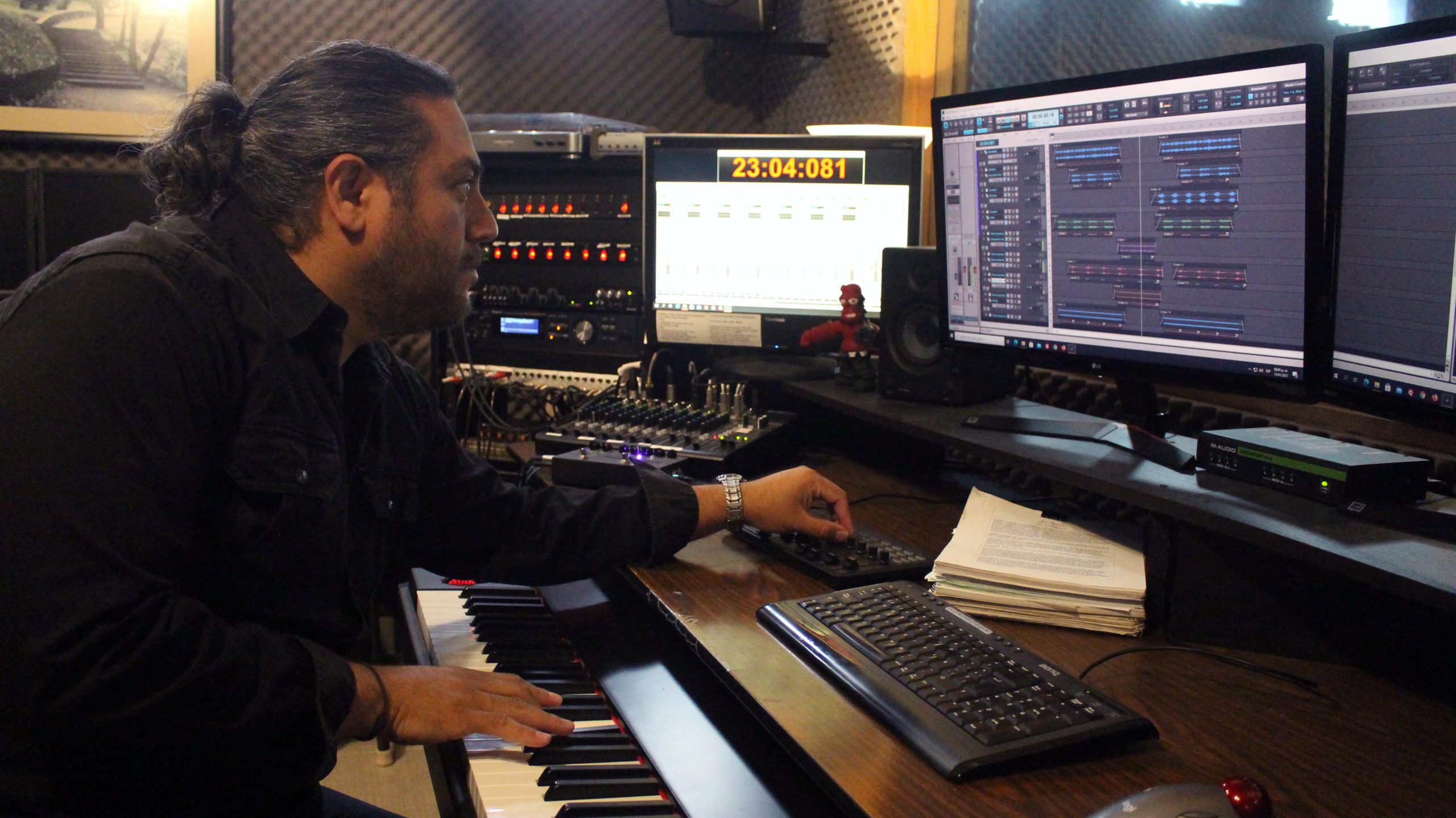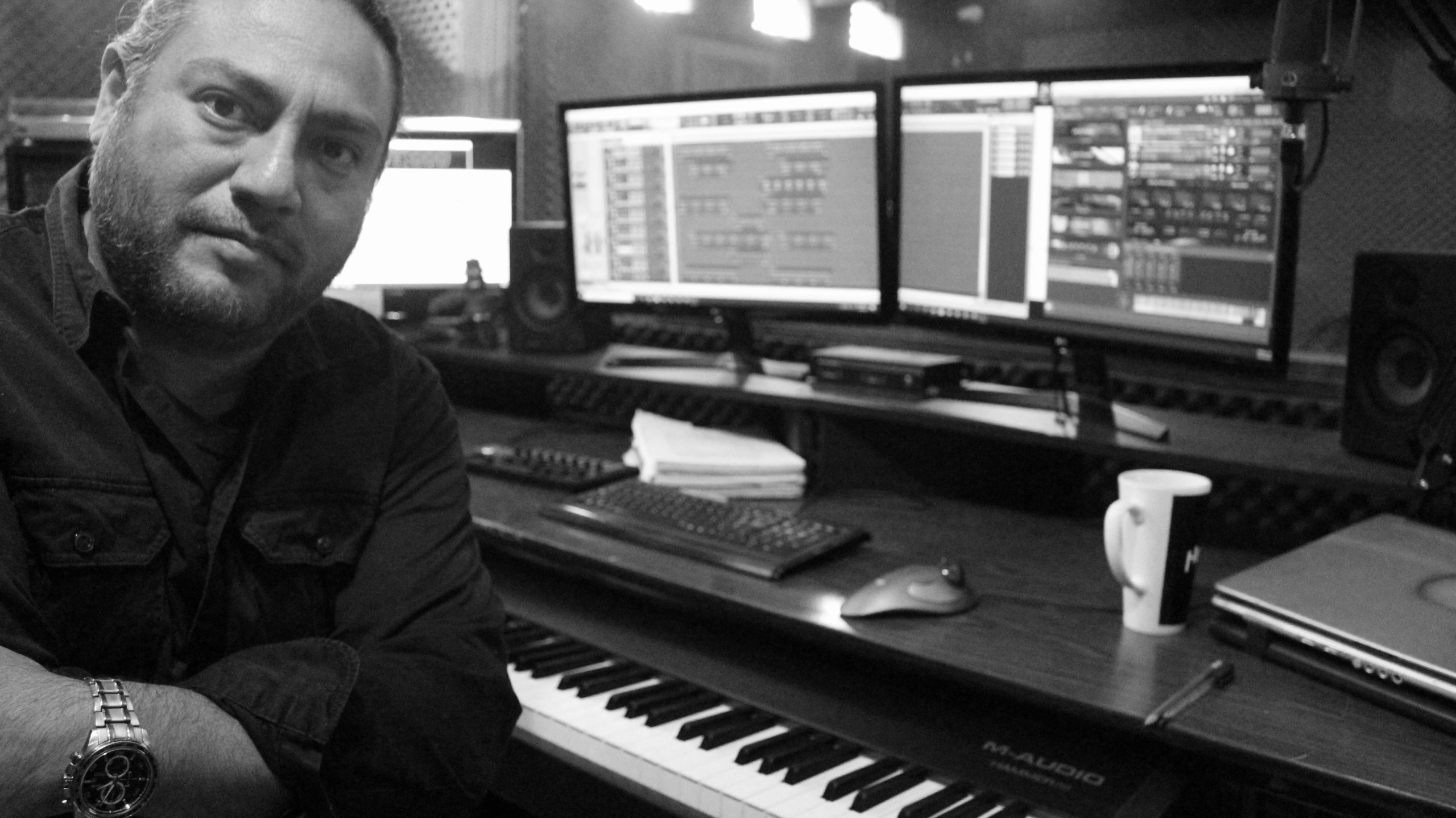18 Feb Meet Jaime Arredondo: Music and Audiobook composer
Melodie’s Craig Hodges had a chat with composer Jaime Arredondo about his career in music, key influences & the composition process.
The Interview
Melodie: Hey Jaime, thanks for taking the time to chat with us! What have you been working on lately?
Jaime Arredondo: Hey Craig. Before anything else, thank you very much for this interview. It’s always a pleasure working with you guys.
Recently, I’ve been composing music for an audiobook that will come out for sale very soon on different digital platforms. “Juliette, Prosperities of Vice”, or in Spanish “Las prosperidades del vicio “ of the Marquis de Sade.

Sounds intriguing! Tell me, how did you first get started in music?
My first contact with music was when I was very young. I think I was about 12 years old, my older brother played electric guitar, and he was a fan of rock music. I started watching him play and listening to some of the bands that he liked: Poison, Guns & Roses, Metallica, Megadeth, Motley Crue, I remember that it was all on cassette and beta videos, or MTV.
That’s where I first saw the electric bass, and you know, I thought, “What is that instrument with 4 strings and why is played with fingers?” It was very difficult to convince my father to buy me one, but my first electric bass was a Washburn 4 string in white. I was happy! My brother got me tablatures so I could learn songs, and that’s where I started to take music seriously.
What a great story! What was the first album you bought?
Hmmm if my memory serves me correctly, at the time it was very common to buy virgin cassettes and make your own mixes. One song from here, another from there. But my first album from a record store was when my family went on a trip to McAllen, Texas, where we bought my brother an Ibanez RG Vinnie Moore guitar. I remember it was impressive – the instrument shop was immense. Then I walked into a record store but I didn’t know what to buy! There were so many cassettes that I didn’t know and I wanted them all! But my first albums were the soundtrack of a movie called ‘The Lost Boys’ and Motley Crue’s “Theatre of Pain”.
Two very different sounds there haha! When did you first start writing music for picture?
After going hard learning to play bass, I was officially determined to study music at 14. It was difficult since in my family there were no artists, just lawyers and engineers. Even my brother, who played guitar ended up being an engineer, so I went against the current.
I remember my parents telling me to study a serious career at the time and that music was just a hobby. But I was the rebellious son, and after so much insistence over and over again my Dad decided to support me.
So I went into music schools to take diplomas, courses, and that’s when boom, I discovered how audio engineering applied to music and video. I started asking, why does that record sound like that? Why does this sound so sharp? How did they get that music into that film? How did they synchronise it with the screen action?
From then on I became very analytical when I watched movies. And by the time I was about 17 years old, I discovered composers who were dedicated to composing music for film: Hans Zimmer, Alan Silvestri, James Horner, Danny Elfman, Elliot Goldenthal. That’s when I decided I wanted to make music for TV and film.
It was a long road because at least in my country there were not many options to study music and much less dedicated to screen composition. So I studied music in traditional and contemporary composition form, and while I was doing that I had diplomas in audio production, sound system design, audio engineering, and when I was able to buy some equipment, I was able to compose recordings and make music and jingles on radio, television and some infomercials.

Can you take us through your writing process?
My composition process is not really strict, each project is different. Before composing, I’ll ask myself some questions: What genre is best? What instruments should I use? Are there are main and secondary characters? Are they good or evil? When is the project set? I try and answer those kinds of questions, as well as familiarise myself with any images of what will be used in the project for inspiration.
From there is when I begin to compose. Something I use a lot of is modal harmony. I like to use the Aeolian, Doric, Mixolydian and Lydian mode combined with elements like ostinatos, either with strings or piano. I feel like I’m kind of minimalist; I start with something simple and repetitive, then I start to put layers, layers and more layers until I get to a climax.
What DAW do you use?
I use PC. I tried with Mac a few years ago, but I like Windows systems better so I use Windows 10 with 3 internal 2TB hard drives: 1 for the system, 1 for audio files (including sample libraries) and 1 for video files. Also 32GB of Ram, 3 x 27” desktop monitors and 2 audio interfaces: a Focusrite 18i20 and a Presonus Studio 26c.
To record, I use Sonar Platinum for music and Protools for audio editing. I’m very addicted to sample libraries like Vienna Symphonic Library, Spitfire Audio, Heavyocity, Sonokinetic, Cinesamples, 8dio, Sonivox and Projectsam. Whenever they release a new pack, I’m like, I want it!!!!
Finally, for synths and sound modules I use Integra 7 from Roland (a very powerful sound module), Yamaha S07, some Alesis modules, Nanosynth, NanoBass, Drum Module DM5. And I use a 2 controller M-audio Hammer88 controller. It has heavy keys, so if you want something similar to a real piano it´s perfect in my opinion. And last but not least, a pad controller; an Alesis Samplepad Pro. It’s great if you want to play percussion in real-time with some drumsticks, instead of programming.
That is quite the set up 🙂 And what keeps you busy outside of music?
In this industry, it is common that the results are a little slow and you have to invest a lot of time and a lot of budget in new toys. So apart from making music, I also produce audiobooks. I’ve been making audiobooks for about 6 years now, from recording the narrator, composing the music if required, effects, to mixing and mastering. I’ve made about 170 audiobooks so far.
Favourite band/artist and why?
This is a bit complicated as I have several favourites. but I think my top one would be Motley Crue. I grew up with Motley Crue and I have countless memories of my youth listening to their music. I like all their records.
I have rock in my veins, but I also like the jazz fusion of Scott Henderson, his album Dog Party fascinates me, he’s an incredible guitarist. For Soundtrack composers, Brian Tyler is a very complete composer. He’s an orchestral conductor, drummer and makes electronic music.
Due to the pandemic forcing us to stay home this year, I ‘ve come across some amazing artists on social media social media. Ainsley McGray with his song ‘Dream Again’ or Cory Marks with his song ‘Outlaws & Outsiders’.
Favourite track of yours in the Melodie library and why?
My favorite track is ‘Believe‘, it’s funny but I consider myself a composer on the dark side., I usually work with a lot of dark sonorities, dissonances, and with this track it was completely the opposite. It has a bright and exciting side, and it took me a lot of work to get right, but the result in using metals and choir left me very happy.
Great choice, Believe is an epic track. Veery hopeful and uplifting! Thanks for your time Jaime 🙂


